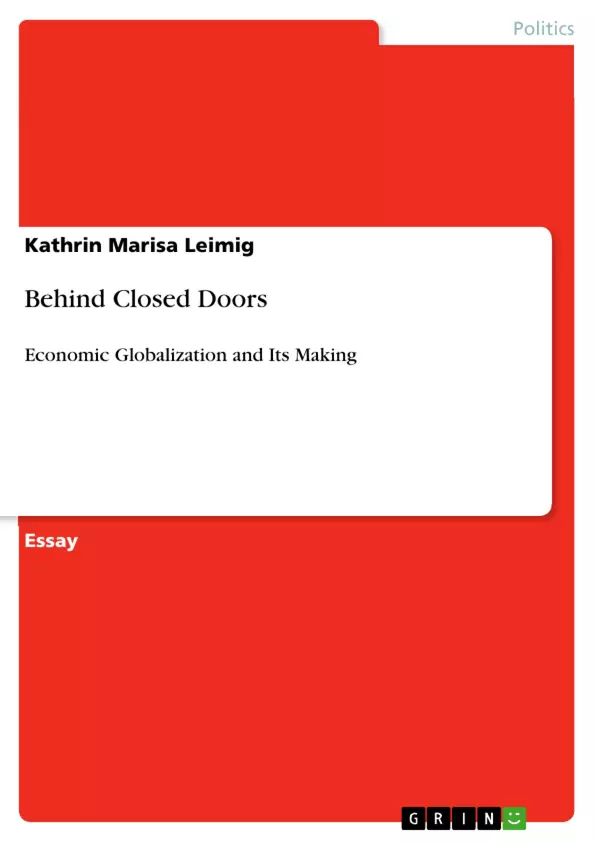What is globalization? Or who is globalization? Is it prudent to make a bargain at ones local H&M branch when buying a shirt as cheap as box of chocolates or does this ostensibly casual snip make oneself guilty of supporting a modern form of slavery taking place somewhere in the developing world? The term globalization creates many questions and provides little answers. For a great majority of the world population globalization in all its complexity and impenetrability is nothing more than a modern myth, a phenomenon that is at the same time inevitable and unchangeable in its nature because it does not necessarily require democratic vote. Its design promotes the assumption that there is nothing anyone can do to change the current globalization process or to intervene in the implementation of economic policies created by the leading international financial institutions. To accept this inevitability like many governments, academics and mass media do means that no resistance is possible. And indeed a growing passivity towards this new form of global governance has emerged, its result being a ‘demonized’ globalization that occurs to only some extent politically restricted, and, surprisingly, without major civil interference. Nevertheless, taking a closer look at the forming and structure of the globalization process allows a clearer understanding of its agents, its forms of delivery and its financial and social consequences for the developed as well as the undeveloped nations.
Table of Contents
- Introduction
- The Creation of Modern Economic Globalization
- Agents of Globalization
Objectives and Key Themes
This essay examines the complex phenomenon of economic globalization and its impact on the global economy. The main objective is to analyze the formation and structure of the globalization process, including its agents, forms of delivery, and financial and social consequences for developed and developing nations.
- The role of international financial institutions in shaping economic globalization
- The impact of globalization on developing nations, including issues of equity and poverty
- The critique of neoliberal policies and the "Washington Consensus" in relation to development
- The undemocratic nature of global economic governance and its implications
- The search for alternatives to the current global economic policies
Chapter Summaries
- Introduction: The introduction defines globalization and explores the notion of its inevitability, highlighting its impact on both developed and developing nations. It raises critical questions about the democratic nature of globalization and the role of international institutions in shaping it.
- The Creation of Modern Economic Globalization: This chapter traces the origins of modern economic globalization to the end of World War II and the Bretton Woods System. It discusses the intentions of the founders, who aimed to establish a liberal international order and regulate capital to prevent future wars and promote economic growth. The chapter also explores the potential advantages and disadvantages of globalization for both developed and developing nations.
- Agents of Globalization: This chapter focuses on the key institutions that have played a significant role in shaping economic globalization, namely the International Monetary Fund (IMF) and the World Bank. It examines their objectives, policies, and criticisms, particularly regarding their "Washington Consensus" approach to development. The chapter also addresses the issue of representation within these institutions, highlighting their undemocratic structures and potential bias towards the interests of industrialized nations.
Keywords
Key terms and concepts explored in this essay include economic globalization, neoliberal policies, "Washington Consensus," international financial institutions (IMF, World Bank), developing nations, equity, poverty, democratic governance, and alternatives to current global economic policies.
Frequently Asked Questions
What are the main agents of modern economic globalization?
The primary agents identified are international financial institutions, specifically the International Monetary Fund (IMF) and the World Bank.
What is the "Washington Consensus"?
It refers to a set of neoliberal economic policy recommendations for developing countries that emphasize market deregulation, privatization, and fiscal austerity.
Is globalization considered inevitable?
The essay explores the myth of inevitability, noting that while many see it as unchangeable, this perception often stems from the undemocratic nature of global economic governance.
What was the goal of the Bretton Woods System?
Established after WWII, it aimed to create a liberal international order and regulate capital to prevent future wars and promote global economic growth.
How does globalization affect developing nations?
The essay analyzes the social and financial consequences for developing nations, often highlighting issues of equity, poverty, and the lack of representation in decision-making bodies.
- Quote paper
- Kathrin Marisa Leimig (Author), 2007, Behind Closed Doors, Munich, GRIN Verlag, https://www.grin.com/document/167449



